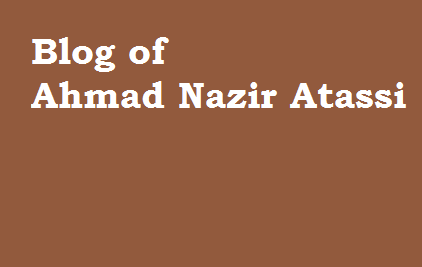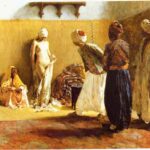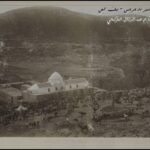Older blog 19 June, 2011
I find that, after three months
of protest and numerous articles written on the subject, Syria remains a
mystery to western readers and media alike. With all due respect to
specialists in Syrian affairs, who added tremendously to our knowledge
and understanding of Syria, a first-hand experience of a native of the
country is still needed to elucidate certain issues that outsiders will
rarely see or understand. Syria is still “the kingdom of silence”, to
use the words of the prominent Syrian dissident Riyad al-Turk. It is a
mystery enveloped in silence and thrown in the deepest abyss of fear.
Nonetheless, plenty of hope for the future of Syria is in the air, and,
for the first time, it is well justified. Syria will unravel with every
day of protest, every voice raised, every protester killed, and every
word written about it. In addition to patience and courage, well in
supply these days, we need to talk about Syria; both Syrians and others
need to talk about Syria because it would be a victory for non-violent
activism. It will set the stage for 21st century activism if the Syrian
uprising, as it is proceeding now, manages to effectuate a change of its
ruling regime; one of few remaining Cold War era Stalinist regimes.
Given the dearth of information about Syria, even specialists find
themselves depending on newspapers, oral interviews, and autobiographies
to write the country’s history, especially for the period beyond the
1950’s. Therefore, there are so many topics worthy of discussing in
order to reach some understanding of the situation today; an
understanding that could enable the observer to formulate a prediction
about the near future. Although no oil worthy of international attention
exists in Syria, the country’s location and history make it an
important link in the chain of events unraveling today in the Middle
East. Many analysts fear a great mayhem in the region if the Assad
regime in Syria fell, because of this regime’s connections with Iran,
Hizbullah in southern Lebanon, Hamas in Gaza, and many other Palestinian
organizations still hostile to Israel and to the peace process. This
fear could be justified on historical grounds, but the future always has
great ways of proving our predictions wrong because we actually never
see the full picture but focus on the worst case scenario when we are
afraid and on the best case scenario when we are hopeful. A middle
ground would be to gather as many factors at play as possible and to
discuss all possible scenarios, at least all the ones we could think of.
Some of the main questions asked today are:* What kind of an uprising we have in Syria and how well organized is it?* Who is in charge on the protesters’ side and who is in charge on the government’s side?* Why should there be an uprising in Syria any way?* Is it really a peaceful uprising and how do we explain the wildly conflicting reports about it?* How can we explain the level of violence and the number of people killed?* For a country of 23 millions, why the number of protesters is relatively small?* What role does sectarianism play in the uprising?* Could the situation degenerate into a civil war?* If there is an end in sight, how would it look like and when would it come?* Whom to believe and how do we get good information about what is happening on the ground?* Why are the EU and the USA so inactive and mildly responsive about the events in Syria?* What role does the new social media play in the uprising? Is it really a Facebook revolution?
I cannot answer all of
these questions now, but I will give my opinion to the questions I
consider important for starting to understand the issues at stake, and
leave the rest to future articles. As I develop more satisfactory
explanations, I will write them in this blog, because there are issues
that even a native needs to research in order to give an informed
opinion.
Putting aside the
academic debate of whether the Arab protests are revolutions or
uprisings or revolts because it does not matter now, I will refer to
what is happening in Syria as the Syrian uprising. This is because it is
indeed a rising up of segments of the Syrian population against
oppression and bad central management. Moreover, regardless of whether
one agrees or disagrees with the protesters, the fact that there is even
one person who is protesting is significant for a balanced analysis of
the situation. One may call the protesters revolutionaries or thugs,
peaceful or violent, sincere or agenda-driven, however, somebody is out
there and is shouting because he/she has demands (legitimate or not).
One should first acknowledge the events before attempting to explain
them. As for naming and judgment calls, they are a part of the politics
of the event; they are part of the fight and will be regarded as
evidence, not analysis. One can simply count the number of protesters in
any given video posted on the web to find out that the Syrian protests
are real and range in magnitude between tens to thousands of protesters,
and at rare time tens of thousands of protesters. Using the rule
stating that for every social action, the number of supporters is about
ten times the number of participants, we can conclude that a wide
ranging movement of protest really exists in Syria. It is surprising to
discuss the mere existence of this movement, but this is a testimony to
how isolated Syria is from the rest of world and to how effective the
government propaganda is, which denies even the existence of
discontented citizens and insists on attributing its military
intervention to countering the activities of armed gangs roaming the
country unimpeded and reeking random havoc.
Am I biased in my opinion
and analysis against the government? Certainly, but it is not an
uninformed bias. I am calling it bias because I am not an eyewitness to
the events. I get my information from previously lived experiences,
books and articles read, family contacts, and the internet. The model I
have of Syria leads to conclusions that conform to the news I hear on
the different media outlets and internet sources. It is a detective’s
work indeed, but historians are nothing but text-based detectives.
Although the events are taking place now, the nature of the information
available, i.e. being based in text, makes any analytical attempt look
like a historian’s work. My knowledge of the Syrian regime, whether
based on lived experience or reading, makes me comfortably sure that
nothing resembling a truth comes from its media. Syria is an Orwellian
state par excellence, albeit less tidy than Orwell’s story. I am
referring to George Orwell’s novel 1984 describing a Stalinist state,
where everything is rewritten to fit an official narrative and where
surveillance is so pervasive that people tend to reproduce the official
narrative in their actions and speech. Journalists unaware of this fact
make the mistake of asking random people about their stories and
opinions without first establishing a rapport with them and build a good
degree of trust. Therefore, most what these journalists get is the
official narrative, especially if they make the even worse mistake of
asking a government official no matter how lowly he ranks in the
bureaucracy. A supporter of the government may believe in its story,
regardless of whether it is correct or not, but an opponent will also
produce a similar story out of fear. Therefore, for journalists, the
majority of whom do not even speak Arabic, it is very difficult to know
the real leaning of their interlocutors, let alone the correctness of
the information they are providing. One way to counter this built-in
bias of the information received is to cross-examine them, receive as
much information from as many sources as possible, make non-verbal
observations, read reports written by foreign diplomats and intelligence
services, learn the history of the country, have a first-hand
experience of it, and most importantly spend some time in the country in
order to build a network of trusted friends from all backgrounds.
The extent of the
dishonesty, as well as the brutality, of the current Syrian regime comes
as a shock to new readers, but there are reasons behind this dishonesty
and brutality. Dictatorial mentalities are not unknown in the Middle
East; for me, they are results of a broader patriarchal culture. This is
a dangerous generalization, especially for a country in transition like
Syria, as well as many Middle Eastern countries. However, the general
outlook of the Syrian culture (or cultures) remains patriarchal. Father
figures are omnipresent in the culture, with their absolutist rule,
pervasive presence, uncompromising stands, know-it-all attitudes,
disregard of opposing opinions, oppressive behavior, and demands of
absolute obedience from subordinates. Many cultures or subculture have
such figures, even in the West. Moreover, there are many subcultures or
microcosms in Syria that do not have such figures. Nonetheless,
especially when it comes to the ruling circles, these figures abound.
The short lived Syrian democracy (mainly the 1950’s) did not give the
Syrian political milieu enough time and experience to develop more
accepting and democratic figures. The younger generation certainly looks
more promising in this regard. A quick look at Syria’s short political
history (political life started effectively in the 1930’s) shows a
fierce competition between ideologies and political parties that were
intent on eliminating their opponents by all means possible. With the
increasing politicization of the army, especially in the 1960’s,
physical elimination became the rule. Each year, as the coups d’etats
multiplied, new precedents of intolerance and Machiavellism were set;
which made the Syrian political game look like a mafia war. Hafiz
al-Assad was not only the winner in this game, but also the last one
standing, owing it to his secretiveness, brutality, backstabbing deals,
and lack of firm convictions other than his own interest and that of his
family.
This is Assad the father,
but what about Assad the son, the current president? The answer is
simple, there is no difference. In Syria now, it is not the president
who rules, but an entire system erected by the father. I would even go
as far as saying that the father rules Syria from his grave. Assad the
father spent no less than the last ten years of his life preparing to
pass the rule of Syria to his sons. The eldest was the most groomed for
the job but he died in a car crash in 1994. A total restructuring of the
regime was needed in order to pass it to the second in line, the
current ruler Bashar, because of his lack of skills and loyal entourage
as well as the refusal of many members of the old guard to submit to the
rule of a 34 year old inexperienced physician. Assad the father made
sure that the system would function according to his planning regardless
of the level of skill of his son. Many foreign diplomats remarked on
the latter’s lackluster personality and his inexperience. So, the
dishonesty and brutality of the father’s regime continued in the son’s
regime but under a veneer of a modernist look made possible by the
services of public relations companies. Yes, the image of Bashar as a
reformer and a modernist that convinced even his people was not of his
making. In fact, the European Union in general, and France in particular
played a big role in making and marketing this image as part of a
larger project of reorganizing the Mediterranean basin in order to make
it into a safe backyard for a revived and unified Europe. Syria was to
become Europe’s foothold in the eastern Mediterranean just like Egypt
was (and still is) for the USA. There is a great deal of dishonesty in
the regime’s outer image, which must be protected by a great deal of
disinformation. The façade was important for the father, in order to
project more power and legitimacy than he really had, and it is still
very important for the son for similar reasons. Furthermore, the
Stalinist style of ruling the father adopted depended on a great deal of
fear rather than a constant use of force, a fear propagated by a few
but excessively vicious strikes and an uninterrupted stream of rumors
and misinformation directed to the inside of the country as well as to
the outside. This aspect of the regime, which is tied to the very
powerful security agencies, has been passed to the son, in addition to
the son’s own lies and dishonesty in portraying himself and his regime.
This explains why it is so difficult to trust anything the regime says.
It is unfortunate that we have to spend any time debunking the lies of
this regime because our focus should be on understanding Syria’s
prospects for the future.
In the coming articles I
will attempt to answer the questions I raised above. It was however
necessary to spend some time clarifying my approach to the situation in
general so as to clarify built-in biases and attitudes, because no
historian or social scientist is ever “cured” of them. I hope you bear
with me because this is my style even in urgent matters; which also
functions as a guard against inconsistencies in methodology due to
personal involvement in the subject of study. My style is constructive
in the sense that I start by laying down the basic assumptions and
attitudes; then I start constructing my explanations from the past,
progressing toward the present and the future. This will certainly take
time to develop. Finally, my reader, have no doubts, I do not claim
objectivity, and my hatred for the Assad regime will be clear in my
writings if it has not already transpired. What I hope for is to explain
this hatred rather than hide it under a fake cover of objectivity.


 al-Jumhuriyya
al-Jumhuriyya




